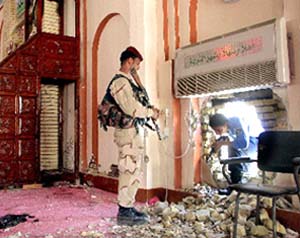| Home / International / International -- Update | Tools: Save | Print | E-mail | Most Read |
| Violence Kills Iraqis, Security Posts Vacant |
| Adjust font size: |
Violence across Iraq killed dozens of people on Sunday, while Prime Minister Nuri al-Maliki failed again to fill three key security portfolios. In the bloodiest attack on Sunday, unknown gunmen forced minibuses to stop on a highway northeast of Baghdad and shot at the passengers on board, killing 19 civilians, a source from the US-Iraqi liaison office in Diyala province told Xinhua on condition of anonymity. The source said that the incident occurred on a highway near the Ayn Layla area, northeast of Baquba, some 65 km northeast of Baghdad, adding two Iraqi civilians were also wounded in the attack and seven minibus drivers were among the dead. In separate incident, police in the southern city of Basra said Sunday that they stormed a Sunni mosque on late Saturday night and clashed with the guards of the mosque, leaving 16 people dead.
The fatal clash came just hours after a car bomb explosion near an outdoor market in the city which killed about 27 people and wounded over 60 others. In the country's capital of Baghdad, Iraqi police also reported the findings of 17 bodies on Sunday. According to a police source, police patrols found seven bodies of men aged between 30 and 40 in the Karrada neighborhood in central Baghdad. Ten other bodies were also found wrapped up in nylon bags near the Bilat al-Shuhadaa primary school in Baghdad's southern district of Doura. The bodies showed signs of torture and were riddled with bullets in the head and chest, said the source. Amid rampant violence across the country, Iraqi parliament on Sunday postponed its session over nominating candidates for three key security portfolios after political blocs failed to reach a consensus. "We have decided to postponed today's session until further notice to give the political blocs enough time to agree on the candidates for defense and interior ministers and minister of state for national security," said deputy parliament speaker Sheikh Khlaid al-Atiya. The postponement was due to rows over the candidate for interior minister among factions in the dominant Shiite United Iraqi Alliance, a Sunni Arab lawmaker told reporters. Fierce political haggling among Iraq's sectarian and ethnic groups forced al-Maliki to leave the three portfolios temporarily unfilled when he presented his new cabinet on May 20. The three vacant posts are currently being held by al-Maliki himself and his two deputies. (Xinhua News Agency June 5, 2006) |
| Tools: Save | Print | E-mail | Most Read |
 |
| Related Stories |
